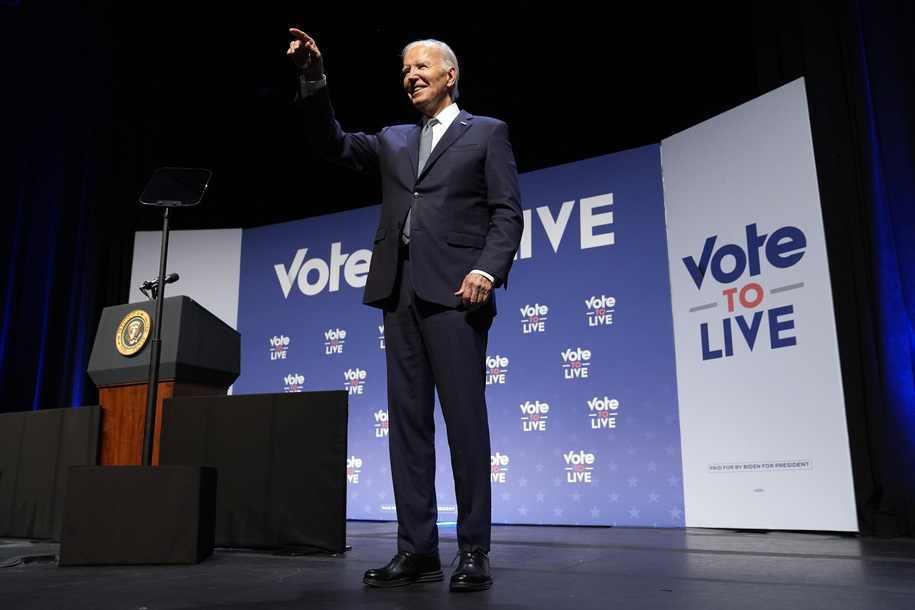Despite continuing calls for him to step aside as the Democratic Party’s nominee, President Joe Biden says he’s not going anywhere. A significant contingent of Democratic leaders disagrees with that decision.
So where do things stand now?
This year’s presidential race was already neck-and-neck heading into a June 27 debate that Biden requested, using rules he established. The result was not great, as I wrote at the time. “President Joe Biden had one job Thursday, one job only—prove to America that he still has what’s needed to be president, despite rampant questions about his age. He didn’t do that. Instead, he validated the worst criticisms.”
Three weeks later, the debate rages on inside the Democratic Party: Should Biden stay or should he go?
The problem is, there is no real mechanism to force him out. Some have said that delegates can take it upon themselves to ditch Biden, given the party rule stating that “Delegates elected to the national convention pledged to a presidential candidate shall in all good conscience reflect the sentiments of those who elected them.” That sounds good on paper, except that it’s not as simple as that.
There are 3,979 pledged delegates to the Democratic National Convention. To oust Biden, 1,990 would have to not just abandon Biden, but do so for a single other candidate. This means there would have to be an actual campaign, with all the trappings that would entail—public appeals for support, clearing the field, and managing the inherent divisiveness of such a move. (Disclosure: I’m a California delegate to the convention.)
In other words, forcing Biden out of the race against his will would require an organized rebellion and unity in purpose that is well beyond the Democratic Party’s ability. You can see it even in the statements of those demanding that Biden quit—few are clearly advocating for the obvious alternative, Vice President Kamala Harris. They all talk about some truncated primary process because the second an actual Biden alternative is named, it generates opposition from supporters of other potential replacement candidates.
That’s why on Wednesday, California Rep. Adam Schiff called for Biden to “pass the torch” without explaining how and to whom. The second he named a name, people would disagree with that alternative, starting a debate that does nothing to help us win in November.
Timing is important here, as there are several deadlines approaching. One is the party’s decision to nominate Biden in a virtual roll call, first agreed on to avoid the filing deadline in Ohio. Like Alabama, Ohio’s deadline has since been moved to after the convention, so efforts to continue with the virtual roll call appear to be motivated by the desire to shut down Biden’s intra-party detractors and lock in Biden’s nomination ahead of the late-August Democratic convention.
That doesn’t mean that Biden, even after being nominated, couldn’t drop out and release his delegates by the convention’s start. The bigger timing issue is simple: We’re less than four months away from Election Day, and every single day that the focus isn’t on Donald Trump is a day that he has effectively won the news cycle.
Elections are usually a referendum on the incumbent. This year, we effectively have two incumbents—a sitting and a former president. So in order to win, we have to make this election about Trump and ask voters whether they want to return to the chaos, incompetence, and fascist tendencies of the Trump administration … but supercharged.
538’s polling average has shown a roughly 2-point drop for Biden post debate, a relatively small effect given his disastrous performance and the media’s near-constant coverage of it. But the explanation is simple: It’s about the narrative.
Before the debate, Democrats said Trump was a dangerous liar, and Republicans said Biden was cognitively addled and old. Then the debate happened, and what did voters see? They saw that Trump was a dangerous liar, and Biden was old and suffering from cognitive decline. The narrative had been set, and the debate confirmed it. Biden missed a golden opportunity to reset that narrative, but it wasn’t to be.
Ultimately, voters saw nothing in the debate that they didn’t already assume was true.
And because of that, some Democrats’ efforts to push Biden out of the race have largely proven self-destructive. The news cycle is speeding past at a dizzying pace. An assassination attempt on Trump four days ago is now old news. Had Democrats shrugged off Biden’s performance and quickly moved on, the whole debacle would now be ancient, mostly forgotten news. Instead, Democrats have insisted on replaying the ordeal in the news every single day.
I get it—we have a lot more at stake than Republicans do. Democrats recognize that our rights and our very democracy are on the line. As for Republicans: What do they have to fear from Biden? Just look at Trump’s nickname for Biden—”Sleepy Joe.” We are fearful of losing our rights, they are fearful of what—a president that falls asleep?
We even have data on this. A March AP poll found that around 70% of Democrats were fearful of another Trump presidency, while a significantly fewer 56% of Republicans said the same about a Biden presidency. He’s just not that scary.
That’s why conservative memes often portray Biden as a puppet being manipulated by George Soros or Bernie Sanders (the Jews!), or Barack Obama or Harris (the scary Blacks!). Or maybe all of the above.
Trump and his MAGA ilk really don’t know how to run against an old white man, someone who looks just like the Republican base. They prefer to run against the “other.” That’s always been the case, and that’s why Trump called Ukrainian President Volodymyr Zelenskyy on July 25, 2019, to try to manufacture a fake investigation against Hunter Biden. That was the same phone call that led to Trump’s first impeachment.
At that time, Biden was polling in the high 20s or low 30s in the Democratic primary. Sens. Bernie Sanders and Elizabeth Warren were polling high, and had they united the left wing of the party, could’ve posed a serious threat. But Trump wasn’t worried about them: He was worried about Biden, and actively working to kneecap his candidacy early. Turns out, Trump had every reason to fear Biden the most.
For his part, Biden is through listening to his party’s critics. He wanted to run for president in 2016, but party leaders pushed him aside in favor of Hillary Clinton. When he geared up to run in 2019, the same voices claimed he was too old and archaic to defeat Trump. Heck, I was saying those things. Yet Biden proved his critics wrong, and did something that has only been done five times since 1912—he defeated an incumbent president.
So the critics in the Democratic Party are saying he should step aside, and he’s thinking, “They were wrong in 2016, they were wrong again in 2020, and they’re wrong again today.”
Of course, the Biden of four years ago is a different one than today’s Biden. Heck, he even seems different from the Biden who nailed the State of the Union address back on March 7. So yeah, people have reason to be freaked out, but the fundamentals of the race haven’t changed. Swapping out a candidate won’t reset the race for the Democrats; it’ll just create strife and ill feelings at a time when we need to be focused on Trump and his Project 2025 agenda. And much of what I wrote pre-debate about why Biden is not looking as bad as the polls indicate? It still holds up today.
Democrats have been overperforming polling since 2020. That includes 2022, when everyone declared that a red wave was inevitably going to sweep Democrats out of power in Congress, state houses, and state legislatures across the country. That certainly didn’t happen. And in regular and special elections, Democrats continue to overperform. Meanwhile, Trump underperformed his polling during the contested part of the Republican primary season.
Even globally, the far right has underperformed polling and expectations in India, Poland, and most recently, in France. (The right was swept out of office in the United Kingdom, but that was well predicted by the polling.) We’re consistently seeing that when facing right-wing authoritarian fascism, voters turn out in greater numbers than predicted, no matter what the polls say.
None of that means Biden is a shoo-in, but we’re not facing a calamitous situation. Indeed, Biden’s chances of winning in 538’s election model have inched up in recent days, to 54%. That’s a coin flip, within the margin of engagement. That was true before the debate, it’s true after the debate, and it will be true after the Republican convention and even the Democratic one.
The winner of the 2024 presidential election will come down to which side out-hustles the other one on the ground, turning out their vote in just a handful of battleground states. There isn’t a single potential candidate (pie-in-the-sky nominee Michelle Obama doesn’t count) that would significantly change the dynamics of this race. The country is locked into hyperpartisanship so strong that few people’s minds will be changed by anything—not even the attempted assassination of one of the candidates. (It’s true: Trump got zero bump.)
With Biden fully committed to his reelection campaign, it serves little purpose for senior Democrats to continue undermining the sitting president. You don’t have to like it (most don’t), you can think it sucks (and you might be right!), but Biden is holding all the cards. We either get back to focusing on Trump and Project 2025, or we give Trump a big assist in his bid to reoccupy the Oval Office.
Campaign Action



